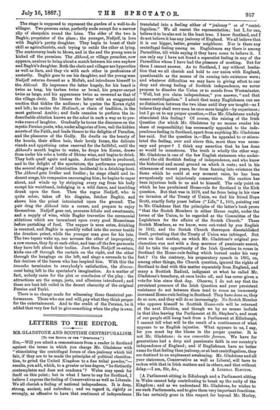LETTERS TO THE EDITOR.
MR. GLADSTONE AND SCOTTISH CENTRIFUGALISM. [To ma Barron ow nro "ElpRozAroo."1
Bra,—Will you admit a remonstrance from a reader in Scotland against the terms in which you charge Mr. Gladstone with " stimulating the centrifugal forces of clan-jealousy which bid fair, if they are to be made the principles of political classifica- tion, to grind the United Kingdom to a fine tribal powder,"— results, you add, which, to a greater or less degree, "be distinctly contemplates and does not condemn 'T Wales may speak for itself on this point ; but in what I have to say for Scotland, I believe I express the feeling of Conservatives as well as Liberals. We all cherish a feeling of national independence. It is deep, strong, ancient, and unbroken ; and we regard it, rightly or wrongly, as offensive to have that sentiment of independence
translated into a feeling either of " jealousy " or of "centri- fngalism." We all resent the representation; but I, for one, believe it to be also not in the least true. I know Scotland, and I do not believe it has any jealousy of England. We all believe that it is our bigger, better, greater neighbour. Nor is there any centrifugal feeling among us. Englishmen say there is among Parnellites, till while saying it they have come to believe it. I can only say I have not found a separatist feeling in any of the Parnellites whom I have had the pleasure of meeting. But for them I cannot answer. As to Scotland, I say without hesita- tion that we all cherish and hold to our union with England, questionable as the means of its coming into existence were; and whatever difficulties we may have in giving effect to our deep and strong feeling of Scottish independence, we never propose to dissolve the Union or to secede from Westminster. "Well, but you claim independence," you answer, "and that means centrifngalism." I admit that many Englishmen can see no distinction between the two ideas until they are taught—as I believe they shall very soon be once more taught—by experience ; but I go on to my proper question,—Has Mr. Gladstone unduly stimulated this feeling ? Of course, the raising of the Irish Question (for which Mr. Gladstone by no means evades his share of responsibility) has necessarily appealed to the inde- pendence feeling in Scotland, apart from anything Mr. Gladstone has said. But the question is,—Has he appealed to or stimu- lated the feeling, over and above this, more than was neces- sary and proper P I think any assertion that he has done so would be monstrous. The truth is wholly the other way. Mr. Gladstone is one of the few English statesmen who under- stand the old Scottish feeling of independence, and who know the historical and moral ground on which it rests; and in his utterances of recent years, far from fanning into existence the flame which he could at any moment raise, he has been scrupulously and injuriously conservative. His caution has been injurious both to us and to himself. The only point on which he has proclaimed Home-rule for Scotland is the Kirk question. But that was in 1878, and far from being in his view an invasion of the Treaty of Union, we find his friend Hope Scott, exactly forty years before (" Life," L, 160), pointing out to Mr. Gladstone that the principles of the latter's book prove "that the Scotch Members in either House ought, under the terms of the Union, to be regarded as the Committee of the Legislature for the affairs of the Scotch Church." These Scotch Members, as we know, were out-voted by you English in 1842, and the Scotch Church thereupon disestablished itself, protesting that the Treaty of Union was infringed. But even on that matter, on which Mr. Gladstone's original pro- clamation was met with a deep murmur of passionate assent, did he take the opportunity of the Irish Question to rouse in Scotland the Home-rule feeling which burned under his very feet On the contrary, his preparatory speech in 1 5, on, among other things, the Church question, ignored the rights of Scotland to deal with this matter separately from England, and many a Scottish Radical, indignant at what he called Mr. Gladstone's treachery, at once broke off, and has never given a vote for him since that day. Observe, I do not say that the persistent pressure of the Irish Question and your persistent resistance do not between them tend to rouse an immensely increased Home-rule feeling in Scotland. They have done so, they do so now, and they will do so increasingly. No Scotch Member who opposes himself to Scottish Home-rule will be returned at the next Election, and though we by no means include in that idea leaving the Parliament at St. Stephen's, and most of our people still hang back from a Parliament at Edinburgh, I cannot tell what will be the result of a continuance of what appears to us English injustice. What appears to us, I say, for you must lay the blame in the proper quarter. It is not Mr. Gladstone: in nos concerti& ferrum. We have for generations had a deep and passionate faith in our country's independence of England; and if Englishmen have no better name for that feeling than jealousy, or at beat centrifugalism, they are destined to an unpleasant awakening. Mr. Gladstone and all your statesmen, Conservative as well as Liberal, will have to reckon with that in Irish matters and in others, and that without
[A Parliament sitting in Edinburgh and a Parliament sitting in Wales cannot help contributing to break up the unity of the Kingdom ; and as we understand Mr. Gladstone, he wishes to see such Parliaments, and to give them very important functions. He has certainly gone in this respect far beyond Mr. Morley,









































 Previous page
Previous page